#Joshua Zeitz
Text
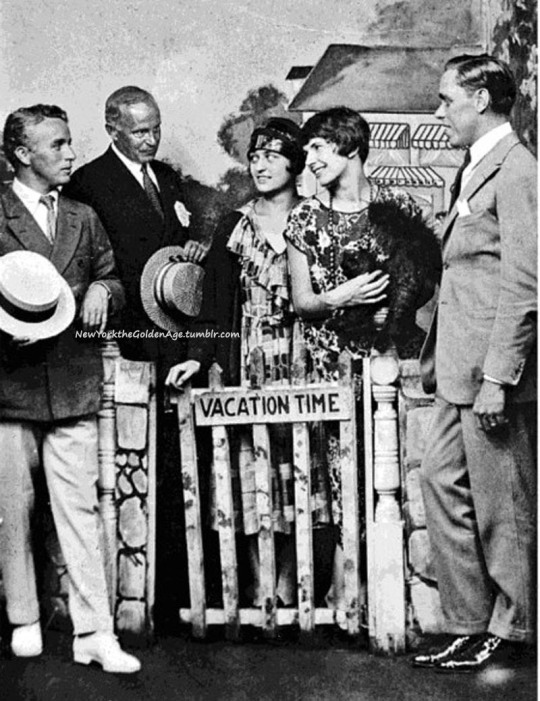
Charlie Chaplin, Vanity Fair editor Frank Crowninshield, sculptor Helen Sardeau, New Yorker staff writer Lois Long, and screenwriter Harry D’Arrast pose in a Coney Island photo booth, 1925.
Photo scanned from the book Flapper by Joshua Zeitz, via A New Yorker State of Mind
#vintage New York#1920s#Charlie Chaplin#Lois Long#Frank Crowninshield#Jazz Age#Helen Sardeau#Coney Island#photo booth#Harry d"Arrast#Joshua Zeitz
47 notes
·
View notes
Text
23 notes
·
View notes
Text

Mike Luckovich
* * * *
Why Nikki Haley’s answer omitting slavery as a cause of the Civil War matters.
What happened.
At a campaign event in New Hampshire, a member of the audience asked Nikki Haley to identify the causes of the Civil War. She gave an evasive answer that omitted slavery as a cause of the Civil War. She said,
I think the cause of the Civil War was basically how government was going to run. The freedoms and what people could and couldn’t do.
Haley was immediately attacked, mocked, and condemned for failing to identify slavery as a cause of the Civil War. During a Thursday morning interview, she attempted to walk back her prior answer with an equally offensive and unconvincing answer. As described in Forbes,
During the Thursday morning interview, she said the goal of the Civil War was to ensure each person has their freedom, including freedom of speech, freedom of religion and the “freedom to do and be anything they want to be without anyone or government getting in the way . . . Yes, I know it was about slavery. I’m from the South, of course I know it’s about slavery.”
Why it matters.
Haley has a history of minimizing or dismissing the role of slavery in the Civil War. The incident on Wednesday is merely the latest episode that reveals her willingness to cater to white nationalists in pursuit of elected office. As former New Jersey Governor Chris Christie said,
She's smart and she knows better. And she didn't say it because she's a racist. Because she's not. I know her well and I don't believe Nikki has a racist bone in her body . . . the reason she did it is just as bad, if not worse, and should make everybody concerned about her candidacy. She did it because she's unwilling to offend anyone by telling the truth.
If she is unwilling to stand up and say that slavery is what caused the Civil War because she's afraid of offending constituents in some other part of the country, if she's afraid to say that Donald Trump is unfit because she's afraid of offending people who support Donald Trump, . . .
What's going to happen when she has to stand up against forces in our own party who want to drag this country deeper and deeper into anger and division and exhaustion?”
Christie is right that Nikki Haley is afraid to tell the truth. But she is also a reactionary conservative posing as a moderate. As the NYTimes noted, her failure to include slavery threatens to destroy her image as someone attractive to moderate Republicans and independents. Per the Times,
Ms. Haley’s appeal as a candidate of moderation is mixed. As governor of South Carolina, she signed some of the harshest immigration and anti-abortion laws in the country at the time, as well as a stringent voter identification law that required photo ID at the ballot box.
But Haley’s omission of slavery was not merely an act of cowardice on her part. She was promoting a dangerous revisionist history of the Civil War that has taken root in the former Confederate states. Haley is promoting the myth of the “Lost Cause” of the South—a romanticized transformation of the brutal practice of slavery into (in the words of Haley) “traditions that are noble — traditions of history, of heritage, and of ancestry.”
I highly recommend a thoughtful and detailed discussion of Haley’s dangerous answer by Joshua Zeitz in Politico, Opinion | Why Was It So Hard for Nikki Haley to Say "Slavery"? Civil War History Has the Answer.
Zeitz writes,
The Lost Cause mythology was more than bad history. It provided the intellectual justification for Jim Crow — not just in the former Confederacy, but everywhere systemic racism denied Black citizens equal citizenship and economic rights. [¶]
With GOP presidential candidates waffling on the Civil War, rejecting history curricula in their states and launching political fusillades against “woke” culture, it remains for the rest of us to reaffirm the wisdom of Frederick Douglass, who in the last years of his life stated:
“Death has no power to change moral qualities. What was bad before the war, and during the war, has not been made good since the war. … Whatever else I may forget, I shall never forget the difference between those who fought for liberty and those who fought for slavery.”
Nikki Haley wants to forget “the difference between those who fought for liberty and those who fought for slavery.” In pursuit of the presidency, she recasts “fighting for slavery” as “noble traditions of history, heritage, and ancestry.” Shame on her.
Haley is telling us who she is. We should believe her.
Robert B. Hubbell Newsletter
#Robert B. Hubbell#Robert B. Hubbell newsletter#Nikki Haley#the civil war#slavery#the old south#White supremacy#The Lost Cause#Mike Luckovich
42 notes
·
View notes
Text




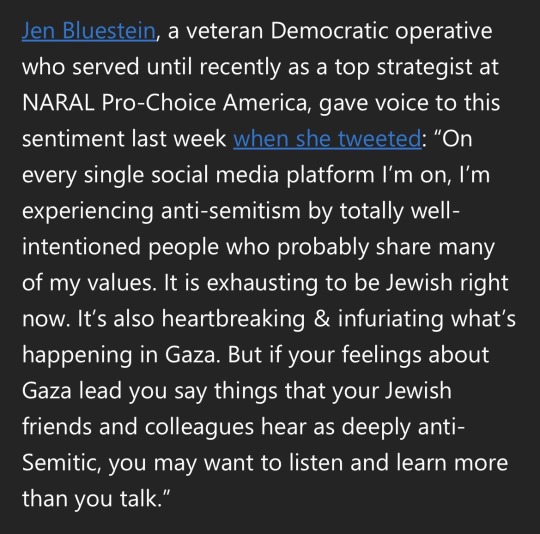
American Jews Won’t Abandon the Left. Will it Abandon Us? — Joshua Zeitz
7 notes
·
View notes
Text

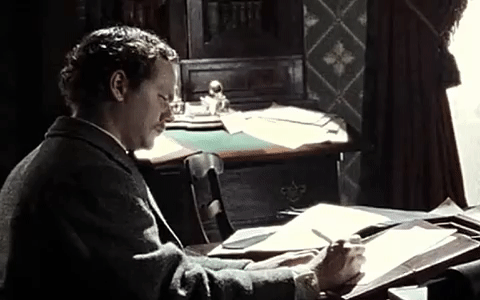




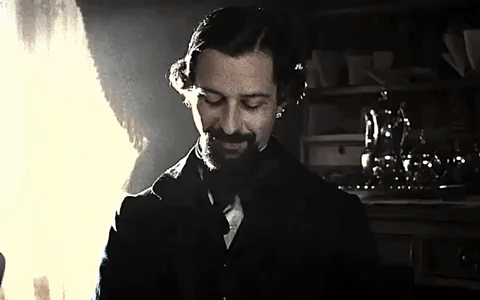

Lincoln (2012) - dir. Steven Spielberg
“If anyone knew the inner mind of [President Lincoln], it was the two secretaries. Witty and prolific letter writers, observant and incisive diarists, Hay and Nicolay left a remarkable record of Lincoln's evolution as chief executive. Better than anyone else, they knew where the president was, what he was doing, and what he was thinking at almost every turn. "The boys," as the president affectionately called them, became Lincoln's official biographers. Enjoying exclusive access to his papers, which the Lincoln family closed to the public until 1947, they undertook a twenty-five-year mission to create a definitive and enduring historical image of their slain leader. It became the great undertaking of their lives. The culmination of these efforts was their exhaustive, ten-volume biography, which was widely serialized between 1886 and 1890, constituting one of the most successful exercises in historical revisionism in American history. Writing against the rising currents of Southern apologia and a popular vogue for reunion and reconciliation, Hay and Nicolay pioneered the "Northern" interpretation of the Civil War an interpretation whose influence waxed and waned but that created a standard against which every other historian and polemicist had to stake out his or her position.” - Joshua Zeitz, Lincoln’s Boys: John Hay, John Nicolay, and the War for Lincoln’s Image
#history edit#gifshistorical#perioddramaedit#abraham lincoln#𝐂𝐀𝐋𝐋𝐈𝐄’𝐒 𝐆𝐈𝐅𝐒#gifset#media: lincoln (2012)#lincoln 2012#acw#american civil war#film edit#calliestag#— 𝐋𝐈𝐍𝐂𝐎𝐋𝐍 (𝟐𝟎𝟏𝟐)#— 𝑨𝑴𝑬𝑹𝑰𝑪𝑨𝑵 𝑯𝑰𝑺𝑻𝑶𝑹𝒀
25 notes
·
View notes
Text
Joshua Zeitz, writing at Politico: In striking down Roe v. Wade and gun regulations, the Supreme Court is cherry picking history. Abortion only began to be criminalized in the mid-19th Century. And the Founders themselves believed gun possession to be a collective right, not an individual right—James Madison himself, the author of the Second Amendment, proposed gun control legislation in New York similar to the law the courts struck down a few weeks ago. States and localities at the time of the Founding routinely restricted gun rights.
… the court’s majority is cherry-picking its history, grasping for any historical example that props up the end it hopes to achieve. Curiously, in the space of 24 hours, the court’s majority moved the goal posts — 1790s for guns, 1850s or so, for abortion — in determining what historical standard should inform the boundaries of constitutional exegesis.
2 notes
·
View notes
Text
Americans Favor Ban on African American Studies
LOS ANGELES (OnlineColumnist.com, Feb. 11, 2023.;--Pushing a controversial ban on College Board African American Studies Advanced Placement courses, Gov. Ron DeSantis (R-Fl.) created more polarization demanding the College Board remove the AP course. Yahooo/YouGov poll shows that about 40 of Americans favor banning AP African American studies, similar to the ban proposed by DeSantis. No surprise that the same Yahoo/YouGov poll found 65% of African Americans oppose any ban on the AP course in contrast to 58% of Republicans that favor a ban. Overall, 46% of Americans oppose the ban, less than the 40% mark. White Americans under lobbying from groups like Black Lives Matter and the Southern Poverty Law Center or National Association for Advancement of Colored People [NAACP] overwhelmingly support the College Board’s Advance Placement in African American Studies.
DeSantis objected to the conflation in the College Board’s African American Studies of including “queer theory” or the New York Times “1619 Project” that urges reparations for African Americans because of official U.S. government policy supporting slavery for African Americans. “This course on Black history, what’s one of the lesions about? Queer theory,” DeSantis said last month. “Now who would say that an important part of Black history is queer theory? That is somebody pushing an agenda,” DeSantis said. Black scholars like Bell Hooks, Angela Davis, TanNehsi Coates, said DeSantis was “divisive.” Core to modern Black studies and essential to include any college-level survey class. “[These are] complicated works of sociology and philosophy. They’re highly contested polemics,” Joshua Zeitz wrote in Politico. Academics want all course material, whether controversial or not.
Yahoo/YouGov’s poll shows that attitudes toward African American Studies fall along racial lines, currently dominated in U.S. party politics. Democrats have become the party of blacks and various gay groups, creating a real polarization between the major political parties. “We read them to sharpen our capacity for analysis and argument. Contra Gov. DeSantis, being assigned a text is not an exercise in indoctrination,” Zeitz wrote in Politico. Republicans, especially Trump supporters, 65% backed a ban on African American AP studies. Showing the contrast, a full 75% of Democrats oppose any ban on African American Studies. Joe Biden’s voters oppose a ban by 75%, corresponding to views of the Democrat Party. Yahoo/YouGov’s polls shows the deep divide between the political parties on the issue of African American Studies, something embraced by 75% of Biden supporters.
DeSantis thinks racial and sexual identity politics should be banned from the public square, thinking that Black Queer studies, reparations, Black Lives Matters, criminal justice reform, should stay out of Democrat debates. DeSantis thinks that race should be kept out of politics and the public square, something opposed by Democrats. DeSantis wants no part of today’s racial politics, where Democrat think race always enters into political discussions. DeSantis and most Republicans believe in American meritocracy where they accept a level playing field where every citizen has the same opportunities and legal protection for success. African Americans and Democrats think the playing field cannot be leveled with “systemic racism” that exists in American society. Yaho/YoGov’s poll shows that 61% of black Americans think that “systemic racism” exists in the country.
Democrats and African American wants critical race theory taught in public schools, stating for the record that there’s no level playing field when it comes to African Americans. Africans Americans and the gay community have take dominant roles in the Democrat Party, subscribing to “systemic racism,” “white privilege” and ubiquitous racial injustice in the criminal justice system. Only 40% of white Americans say that “U.S. public school students are currently taught about African-American history are appropriate. DeSantis and former President Donald Trump are satisfied with the current content of U.S. racial history that tends to minimize the role of slavery, Jim Crow laws and racial discrimination on the success of African Americans. DeSantis has banned Florida’s education system from teaching about critical race theory, blaming whites for discrimination and slavery.
Yahoo’YouGov’s poll shows that the country has a nationwide divide on racial politics, diving blacks and whites, Democrats and Republicans. Democrats overwhelmingly believe that race plays a ubiquitous rule in American politics. Democrats and Republicans are more divided than ever about role of incorporating African American studies, including the role of slavery, Jim Crow, reparations and critical race theory into social studies curriculum in K to 12 public school curriculum. DeSantis in particular wants to ban the new African American curriculum from public school, returning to time when it was taboo to teach anything approaching the truth about American history, especially as presented by historian Howard Zinn. Democrats and Republicans have grown even more divided when it comes to U.S. history, with Republicans seeking to perpetuate old myths and stereotypes.
About the Author
John M. Curtis writes politically neutral commentary analyzing spin in national and global news. He’s editor of OnlineColumnist.com and author of Dodging The Bullet and Operation Charisma.
0 notes
Text
Flappers:
Young ladies with short hair, cigarettes dangling from their painted lips, and dancing to a live jazz band experimented with their newfound liberties defined flappers in the roaring twenties. The flapper is the most iconic cultural icon of the 1920s. A young woman with a short "bob" hairdo and a cigarette dangling from her painted lips dances to the sounds of a live jazz band. Flappers revelled in the new freedoms brought about by the end of World War I and the beginning of a new period of wealth, urbanisation, and consumerism. The decade began with the enactment of the 19th Amendment, which granted white women the right to vote. Women also increased their labor-force participation, actively engaged in the nation's emerging mass consumer culture, and enjoyed greater personal independence. Despite the exhilarating freedoms epitomised by the flapper, true liberty and equality for women remained elusive in the 1920s, and it would be left to subsequent generations of women to fully benefit from the social transformations wrought by the decade. The precise origins of the term "flapper" are unclear. While the actual origin of the term "flapper" is uncertain, it is said to have originated in Britain before to World War I, when it was used to characterise gawky young adolescent ladies. Following the war, the term became synonymous with the new generation of 1920s women who wore skirts that skimmed their knees, smoked cigarettes and drank alcohol while dancing in jazz clubs, constantly surrounded by fawning male suitors.

youtube
Flappers were identified by their clothing, dancing, and conversation.
According to Joshua M. Zeitz in Flapper: A Madcap Story of Sex, Style, Celebrity, and the Women Who Made America Modern, flapper fashion would not have been complete without the creeping hemline, which reached a frightening 14 inches above the ground by 1925 or 1936. The scandalous appearance was complemented with sheer stockings, which were occasionally rolled below the knees. Flappers wore their skirts shorter to show off their legs and ankles, but also to dance. They were especially fond of the Charleston, a 1920s dance fad that included waving arms and fast-moving feet and was pioneered by African Americans, initially in the South and then in Harlem. Dancing was difficult in traditional women's attire, not only because of lengthy gowns, but also because of traditional corsets, which firmly constricted a woman's abdomen and highlighted her waist. Around 1923, French designer Coco Chanel popularised the "garçonne style," which included not just high hemlines but also lowered or nonexistent waistlines and straight, sleeveless shirts. This innovative style allowed ladies to dance freely by using lighter and more flexible undergarments that generated a straight, slender profile. Flappers were defined not only by their clothing, but also by their demeanour and attitude. Flappers were youthful, fast-moving, quick-talking, daring, and unconcerned with prior social conventions or taboos. They smoked cigarettes, drank alcohol, drove vehicles, and kissed and "petted" various guys.
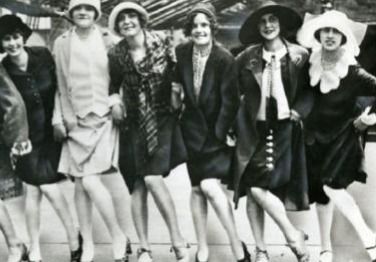
youtube
The flapper emerged from a changing American landscape. For the first time in the country's history, more Americans (51 percent) lived in cities rather than in rural areas by 1920. As a result of the country's urbanisation and economic expansion, an increasing number of women were entering the labour market. By 1929, more than a quarter of all women, and more than half of unmarried women, were gainfully working. However, for the most part, the growth in working women did not pose a threat to established gender norms. Domestic servants made up over one-third of all working women in the 1920s, with the remainder working as clerical employees, manufacturing workers, retail clerks, and other "feminised" professions. Even trailblazing female politicians encountered gender-based obstacles: Most female officeholders focused on "women's concerns," preventing them from gaining too much authority inside their political parties. It was progress, though, with a few women elected to the United States House of Representatives (but none to the Senate) and many more serving at the state and municipal levels. Not only were women hitting a glass barrier in terms of career opportunities, but workplace discrimination and income inequalities were also prevalent throughout the '20s. According to Gail Collins' book America's Women, the average weekly pay for males in 1927 was $29.35, but it was just $17.34 for women. Although their incomes did not match those of their male counterparts, working women utilised their purchasing power to participate in the nation's emerging mass consumer culture. "Certainly, the character of household life changes for metropolitan women in the '20s," Dumenil adds. Nearly two-thirds of American houses had electricity by 1927, and new consumer items such as the washing machine, refrigerator, and vacuum cleaner were transforming housework and family life. Many of the new items, such as domestic appliances, apparel, and cosmetics, were aimed primarily towards women.
Referencing:
Sarah Pruitt. (2018). How Flappers of the Roaring Twenties Redefined Womanhood. [Online]. History. Last Updated: 17 September 2018. Available at: https://www.history.com/news/flappers-roaring-20s-women-empowerment [Accessed 12 December 2022].
0 notes
Quote
Many of today’s progressives define their movement by commitment to a specific menu of policies, and those who don’t share this very specific set of goals are easily read out of the progressive movement, typecast as “neoliberals” or “corporate liberals.” This kind of rigidity is something that their progressive forerunners never exhibited. The progressive movement of the early 1900s was successful precisely because it was flexible and incorporated a wide range of views—so much so that the movement defies easy definition.
Author Joshua Zeitz at POLITICO on how the progressive movement of the early 20th century was a success because of its flexibility and pragmatism.
Yep. You can have ideological rigidity or you can have progress, but history has shown that you seldom can have both.
#joshua zeitz#progressives#ideology#coalitions#flexibility#power#the progressive movement#early 20th century
1 note
·
View note
Photo

Finished March 6, 2021. Two stars.
Flapper: A Madcap Story of Sex, Style, Celebrity, and the Women Who Made America Modern by Joshua Zeitz
[long exhale] ughhhhhhhhhh this book. Listen, I’m a sucker for a book about the twenties and I live for any and all mention of my fave problematic literary couple the Fitzgeralds but BOY does this book really miss the mark. It is absolutely impossible to read this book about women and not notice that it’s written by a dude. If it was done well I wouldn’t care but man this guy just is so WEIRD about everything! My dude over here talking about the changing social mores and how young women in the twenties were having more orgasms than their mother did at their age and ????? I don’t...how do you even get the data? I don’t want to know. It just made me uncomfortable every time he talked about women’s sex lives and women’s behavior because he made everything seem so sexy and scandalous and like...just say what they did and don’t put a spin on it with your weird hush hush telling a secret incredulity about it. Not to mention I felt like the book was repetitive, spent a lot of time talking about men (considering it’s billed as being about the women of the era...), and he had nothing to say about Coco Chanel’s Nazi sympathy other than #girlboss basically, but made room for mention of racist comments and acts without condemning them. I just did not like this very much at all and I don’t think it’s well written, well organized, or thought through.
0 notes
Photo
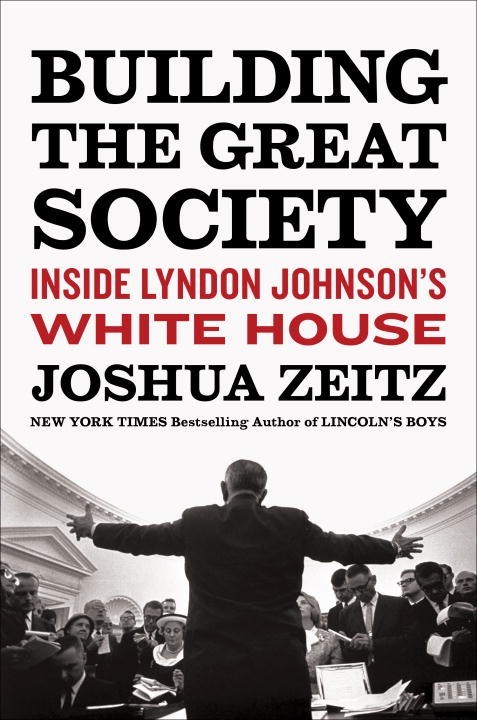

Despite the domestic and foreign turmoil during his administration, President Lyndon B. Johnson had a grand vision for America, “The Great Society”, passing ambitious and wide sweeping acts of legislation. Historian Joshua Zeitz recounts Johnson’s five years as President in his brilliant new book, Building the Great Society: Inside Lyndon Johnson’s White House, available today from Viking Books.
#Building the Great Society#Joshua Zeitz#Viking Books#Penguin Random House#U.S. History#Lyndon B. Johnson
1 note
·
View note
Text

It's always a good day to add a brand-new book about Lyndon Johnson to the LBJ section of my personal library -- a section which might eventually just require building a new wing to my home in order to fit my LBJ collection!
Thanks to the wonderful folks at the Cambridge University Press for sending me an advance copy of LBJ's America: The Life and Legacies of Lyndon Baines Johnson (BOOK | KINDLE). LBJ's America is a collection of essays from many prominent historians about President Johnson, his life, his times, and the legacy he left behind. The essays featured in the book were selected and edited by historians Mark Atwood Lawrence, the current director of the LBJ Presidential Library at the University of Texas in Austin, and Mark K. Updegrove, who was director of the LBJ Library from 2009 to 2017 and has been President and CEO of the LBJ Foundation since 2017. It would be difficult to find two contemporary historians better equipped to help tell Lyndon Johnson's story today.
I just received my copy of LBJ's America late this afternoon, but you can be sure that I've already jumped into the book without hesitation. And since the book features essays by an impressive lineup of historians including Peniel E. Joseph, Julian Zelizer, Joshua Zeitz, Nicole Hemmer, Melody Barnes, and Fredrik Logevall -- among others -- each chapter of LBJ's America is an excellent window into President Johnson and the triumphs and failures of his Administration as he actively sought to make the most of his unexpected opportunity to be the most powerful person in the world and actually accomplish goals which truly changed people's lives. After all, as LBJ once said when asked why he was trying to achieve things that were seemingly impossible politically, "What the hell is the Presidency for?".
I'm not completely finished reading the book yet, but even after just a few hours of progress, I can strongly recommend LBJ's America: The Life and Legacies of Lyndon Baines Johnson (BOOK | KINDLE). Pre-order it now wherever you buy books and you can get your copy of LBJ's America as soon as it is released on October 19th!
#History#Books#Lyndon B. Johnson#LBJ#Lyndon Baines Johnson#Lyndon Johnson#President Johnson#LBJ's America#LBJ's America: The Life and Legacies of Lyndon Baines Johnson#Book Suggestions#Book Recommendations#Book Reviews#Books About Presidents#Cambridge University Press#The Johnson Treatment#Mark Atwood Lawrence#Mark K. Updegrove#LBJ Library#LBJ Foundation#Lyndon B. Johnson Presidential Library#Politics#Political History#Johnson Administration#LBJ Books#Books About LBJ
10 notes
·
View notes
Quote
There’s a reason why Keurig and other corporations don’t want to “take sides” in these fights because they risk losing customers over such a contentious issue. But an increasing number of corporations are willing to tell millions of conservatives to take their business elsewhere. . . . You never see companies blabber about their values and pull ads from left-wing media. The ineffectual counter-boycott against Rachel Maddow earlier this year proved corporations have no problem with supporting progressives.
In fact, corporations have deliberately cultivated progressive images. Sending out tweets mocking Trump, openly embracing the LGBT cause, and hosting panels for Black Lives Matter are all things mega corporations do to show to customers that they’re woke.
Punishing conservative voices is just part of that new branding mission. Leaving those ads up means a corporation draws the ire of activists, a big no-no for their cultivated wokeness. Companies will still try to obscure this bias with vague language on “values” or refusing to take sides, but the message sent to customers is clear: we stand with the Left.
Conservatives may hope to start similar efforts, however, they can’t draw on the rhetoric that these left-wing activists use to make their campaigns appealing to boardrooms. Gaze at this one example of corporate speak that would never be given in response to conservative demands.
“We’re not banning them because they’re alt-right or conservative,” Joshua Zeitz, vice president of corporate communications at the ad-tech company AppNexus, told The New York Times in January on why his company was dumping Breitbart. “We banned them from our marketplace because they violate our hate speech policy, which prohibits ad serving on sites that incite violence and discrimination against minority groups.”
To the determiners of corporate policy, conservatives preach hate while the Left — including Antifa and race agitators — only advocate love. Plus, corporations think young consumers will reward them by currying favor with the Left, and the bottom line is what matters most for these hip capitalists. What’s happening to Breitbart and Hannity is only the beginning of what the Left will do to its enemies in the years to come. The Left knows money talks, and corporations are more than willing to make sure the Right hears the message loud and clear.
Scott Greer, Companies Must Punish The Right To Prove They’re Woke
#Scott Greer#boycott#advertising#companies#Daily Caller#quote#Joshua Zeitz#hate speech#double standards#Breitbart#Sean Hannity#consumers#progressivism#Rachel Maddow#conservatives
5 notes
·
View notes
Text
booklist
People have been asking me if I have a list of books I like/have mentioned in Darcy fics and since I’m terribly disorganized, I do not! But I’m putting together this post of some of my faves that have probably been mentioned in passing:
Beauty culture/makeup/style books:
Laren Stover’s Bombshell Manual of Style and The Bohemian Manifesto
Kevyn Aucoin’s Making Faces and Face Forward
Dita von Teese’s Your Beauty Mark
Luca Turin and Tania Sanchez’s Perfumes: The Guide
Chandler Burr’s The Perfect Scent
Pamela Clark Keough’s Audrey Style
Robyn Cosio’s The Eyebrow
Daniela Turudich’s Art Deco Hair
Travel memoirs/books/foodie things:
Amy Thomas’ Paris, My Sweet
Elizabeth Bard’s Lunch in Paris
Dianne Hales’ La Bella Lingua, Mona Lisa, and La Passione
Any book by Bill Bryson (he just makes me giggle in public)
Julia Child’s My Life in France and As Always, Julia
Bee Wilson’s Consider the Fork
Anne Bryn’s American Cake
History--especially heavy on 1920s history:
Sarah Churchwell’s Careless People (about the real-life murder that inspired the Great Gatsby) and The Many Lives of Marilyn Monroe (my favorite Marilyn Monroe book--it’s a sympathetic, smart analysis of how Monroe’s image has changed over time). Like Bill Bryson, I’d read anything she wrote. She’s fantastic.
Lucy Moore’s Anything Goes!
Joshua Zeitz’s Flappers
Judith Mackrell’s Flappers
Gertrude Stein’s Paris France
Hemingway’s A Moveable Feast
Sarah Vowell’s Assassination Vacation and The Wordy Shipmates
Claire Harmen’s Jane’s Fame: How Jane Austen Changed the World
Lucy Worsley’s The English Art of Murder
Karal Ann Marling’s As Seen on TV and Merry Christmas! (histories of American mass culture and holidays)
Susan Tyler Hitchcock’s Frankenstein: A Cultural History
Kasher and Schoenberger’s Furious Love: Elizabeth Taylor, Richard Burton, and the Marriage of the Century
Sam Wasson’s Fifth Avenue, 5 AM: Audrey Hepburn, Breakfast at Tiffany's, and the Dawn of the Modern Woman
Creativity/happiness/hygge/art books:
All of Gretchen Rubin’s books, but especially Happier at Home
Ingrid Fetell Lee’s Joyful (my new absolute favorite--so great!)
Elizabeth Gilbert’s Big Magic
Twyla Tharp’s The Creative Habit
Chris Baty’s No Plot, No Problem!
Marie Tourell Soderberg’s Hygge
Meik Wiking’s The Little Book of Hygge
Jonny Jackson’s The Joy of Hygge
All of Keri Smith’s books
Beth Lisick’s Helping Me Help Myself
Flora Bowley’s Brave Intuitive Painting, Creative Revolution, and the upcoming Art of Aliveness
Alena Hennessy’s Intuitive Painting Workshop
Kimberly Wilson’s Hip, Tranquil Chick and Tranquilologie
Mystery novels:
Kerry Greenwood’s Phryne Fisher books and Corrinna Chapman novels
Agatha Christie, but especially The Sittaford Mystery, because Emily Trefusis is my girl
Ngaio Marsh’s Artists in Crime
Jasper Fforde’s Thursday Next novels
Creative Nonfiction:
Susan Orlean’s The Orchid Thief and The Bullfighter Checks Her Makeup
Steve Almond’s Against Football and Candyfreak
John Jeremiah Sullivan’s essays for GQ magazine/his essay collection Pulphead
I’ll probably add to this, but this is a start!
36 notes
·
View notes
Note
Hey! I remember your blog a few years ago had a lot of information and stories about LBJ. I know you don’t post about him any more, but I was wondering if you have ever watched the movie “All The away” with Bryan Cranston? My parents have it on Amazon Prime and I was wondering if it’s not only a good movie, but if it’s accurate as well. Thank you and have a nice day’
Hi! Omg that's such a throwback... I remember when that movie came out, going to my aunt's to watch it because we didn't have HBO (or internet lol) at home
It's been quite a few years since I saw it, but from what I remember it's a fairly accurate portrayal? The only "issue" that I can recall is that they actually depict him as a bit softer on civil rights early on than he really was — LBJ was one of the earliest civil rights proponents in the Kennedy administration, before JFK or RFK. This piece from Joshua Zeitz covers that a bit more
Tbh I was just thinking about that movie the other day and how I should rewatch it... maybe I will soon 👀 Please let me know what you think if you watch it!
3 notes
·
View notes
Quote
But voters aren’t distributed the way they were in 1970. It’s the educated suburbs that are up for grabs now, and voters there simply don’t confront violent crime on a daily basis in the same way that the working-class Democrats of Brooklyn or Milwaukee did a half century ago. If they don’t perceive crime as a threat to them personally, will it motivate their decisions in November 2022? The historical record would suggest that it won’t.
Joshua Zeitz in Politico
3 notes
·
View notes